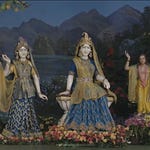This word ‘basant’ originated from the Sanskrit word ‘vasant’, starting with ‘v’. So ‘basant’ originated from the Sanskrit word ‘vasant’. And this word ‘vasant’ is derived from the root word ‘vas’, which means ‘to dwell, to shine, to bring joy, or to renew, or to refresh’. And added to this root word ‘vas’, ‘ant’; it's a suffix. So what is formed is the word vasant. And the literal meaning is ‘to bring joy to the heart’. That's what it means.
So spring, or translated as Vasant, is known as Ritu Rāj, means king of seasons. Because it brings creation, it brings renewal, and it brings joy to nature, to mother nature. Yes. This word ‘vasant’ is also associated with Vasudha, means earth. Because this season, it rejuvenates the planet with new life. And it is also linked to ‘vasu’, which means wealth and prosperity. Because nature, it appears in abundance, and it flourishes this time of the year. It does. It flourishes.
So the word ‘basant’ was evolved from vasant through prakrit and apabhrāmsha, linguistic changes. So it evolved from ‘vasant’ to ‘basant’. And ‘basant’, fundamentally, it means that which brings joy and enlivens nature. And it originates from the root word ‘vas’, which signifies brightness, stability, and joy.
This season of Holi, or the auspicious occasion of Holi, it actually begins on this very day in India, on Vasant Panchami, and it continues for 40 days, 4-0, continues for 40 days. And it is believed that the absolute personification of Divine love, the enticer and the stealer of the hearts of all the souls, Supreme Brahma Shri Krishna, whom we worship in this very mandir, He starts playing Holi on this very day, on this day of Vasant Panchami. And all the temples across Braj Mandal witness the magnificent blend of colors and devotion!
So Vasant Panchami, or Basant Panchami, the true significance of Vasant Panchami is that we resolve on this day to cultivate the spring of God's love. The spring of God's love within us through bhakti, through devotion, through spirituality.









